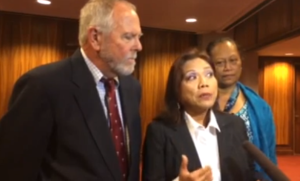Homeless in Hawaii? Lawmaker wants to give you a free flight home

TICKET TO RIDE: House Majority Floor Leader Rida Cabanilla wants to taxpayers to fund airline tickets for homeless so they can return to their home state.
By Malia Zimmerman | Watchdog.org
HONOLULU — A Hawaii state representative says it’s time state taxpayers give the homeless a ticket to ride .
Rep. Rida Cabanilla, D- Ewa Beach, wants Gov. Neil Abercrombie to implement “Return to Home,” a pilot program signed into law in June 2013 that set aside $100,000 over three years to buy homeless people from the U.S. mainland one-way airfare home.
The number of people living on Hawaii streets continues to climb, rising 32 percent during the past five years to at least 6,300, according to the Department of Housing and Urban Development.
Cabanilla says giving the homeless airline tickets would reduce the ever-growing problem of homelessness in Hawaii and ensure the homeless can reconnect with family and support networks in their home states. It would save Hawaii taxpayers millions in welfare costs, she said.
However, neither the governor nor the state Department of Human Services, the agency that establishes and administers the program under state law, has implemented the program.
“This appropriation is much-needed to decrease the homeless population in our state, to return these stranded homeless individuals from the mainland to an environment of their choosing, and most importantly to preserve these funds for our own homeless kamaaina (literally, children of the land). Let us implore the governor to release the money and create the program,” Cabanilla said.
The governor declined to comment and referred all inquires to the Department of Human Services.
Patricia McManaman, director for the Department of Human Services, said DHS has no plans to implement the program as is.
“The Department of Human Services believes the Return to Home program is an invitation to purchase a one-way ticket to Hawaii with expectations of a guaranteed return flight home. This expectation is particularly high when the state is managing the program and paying for the ticket,” McManaman said.
She said her agency applauds the Waikiki Improvement Association and its member hotels, restaurants and other businesses that are proposing a privately funded Return to Home program for the homeless.
“A Return to Home program is best supported by the community through private donations and individual charities, and not the state,” McManaman said.
She noted that under the Return to Home program the agency was required to create a database to track program participants, to secure appropriate travel documentation, to screen for outstanding warrants or pending criminal cases, to locate family or friends willing to provide housing and support for the individuals upon their return, to provide transportation to the airport, to counsel individuals on airport logistics, and to assure that participants also were provided with education on hygiene.
“No additional staffing was provided to the DHS to implement these program requirements,” McManahan said.
Senate Minority Leader Sam Slom, R-Hawaii Kai, said he agrees the program is counter productive, will not solve any major part of the homeless problem and simply encourage more people to come to Hawaii knowing they can get a free ride home on the state taxpayers’ dime.
“Politicians always think first, and erroneously, about throwing money — not their own — at problems. All that does is waste money that could be used for better outcomes,” Slom said.







